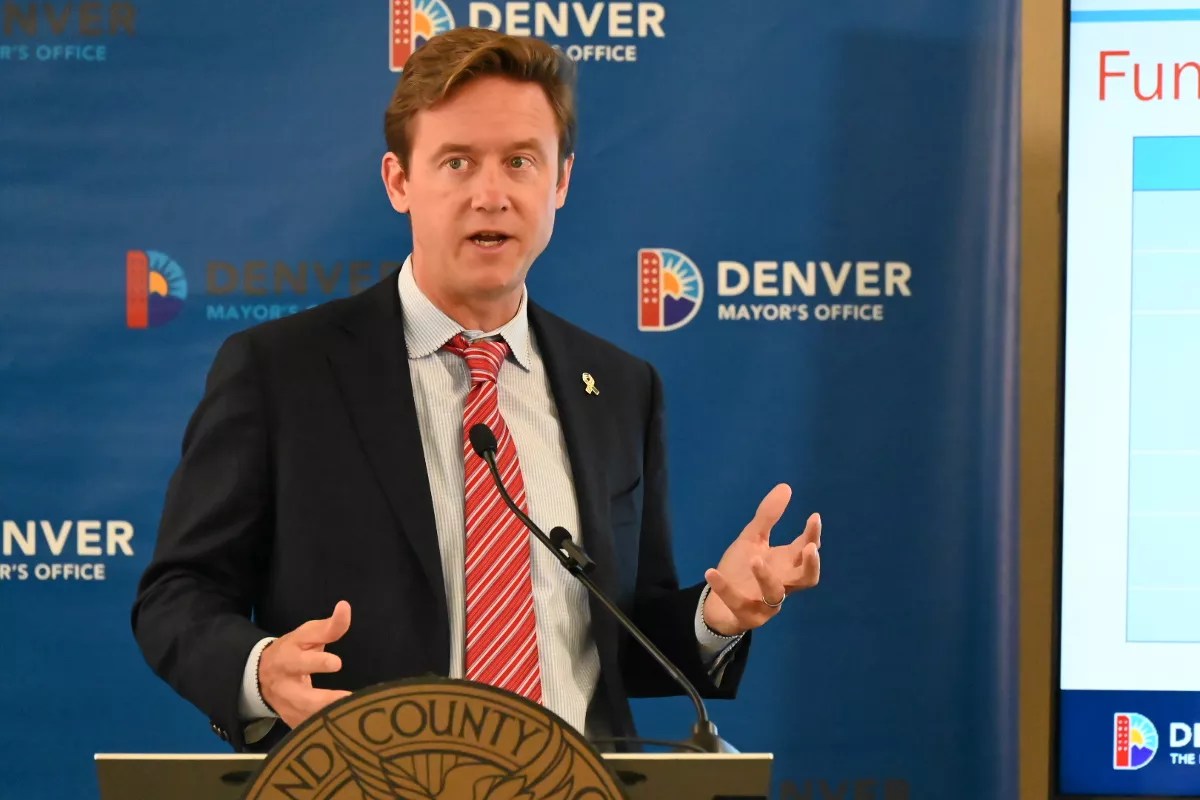
Bennito L. Kelty

Audio By Carbonatix
Mayor Mike Johnston has revealed the expected tab for his homelessness housing plan, with an estimated $48.6 million going toward his administration’s coordinated effort to get 1,000 individuals off the streets by the end of 2023.
“These resources will give us the path to get the 1,000 units we need to get people out of unsheltered homelessness with the wrap-around services they need to be successful,” Johnston said at a Tuesday, September 12, press conference. “We can do that without cutting back from the other critical city services.”
Johnston announced earlier this year that he’d be tackling Denver’s homelessness crisis head-on – publicly pledging to target the city’s roughly 2,800 unsheltered residents and provide them with various types of housing and services.
The city has since started labeling the initiative the “House1000″ plan.
On Tuesday, the mayor broke down the cost of his plan into four types of expenses: the cost to convert hotel rooms, to build micro-communities, to contract for leased units and to clear encampments.
Micro-communities, which are a major part of House1000, will cost approximately $19.6 million for pallet shelters, tiny homes, site preparation, utilities, site operation and support services at each one.
Johnston unveiled the planned locations of eleven micro-community sites last month, but neighbors have voiced concerns about some of them before construction has even begun. The mayor addressed those concerns Tuesday, saying that the data backs up the city’s stance that micro-communities are safer than the alternative.
“If you look at the safety risks at the places that are micro-communities like the ones we’re describing, in the last calendar year, all of 2022 combined, we had a micro-community that had a total of three service calls,” Johnston said. “Another had fourteen.”
In contrast, the city received more than 6,000 calls for emergency response at encampments in 2020, according to the mayor, while non-congregate shelters had over 2,000 calls.
“So you’re talking about sites that are literally one-one thousandth of the safety risk to the community of what the current situation is,” Johnston concluded. “The most dangerous thing to communities would be for us to do what we’ve done in the past. That’s actually the single most dangerous strategy – is keep folks living in encampments that are unsupervised, unstructured, unsafe.”
The mayor plans to start moving people out of encampments and into housing by November or December, a time frame Johnston calls “moving day,” he said at a press conference last month.
However, he announced on Tuesday that this week the City of Denver will launch its “encampment resolution model” to test how people will actually be moved from encampments to housing units. “It will be our first process to begin to connect people to housing, close those encampments, house people and keep those encampments closed,” he said.
He set aside $750,000 in the housing-plan budget for “encampment response” to move homeless residents; the funds will be used for outreach, transportation, temporary portable bathrooms and “related services,” according to the budget.
“The long-term goal being that we can move out of homelessness and into housing,” Johnston reiterated. “We can then close these encampments, keep these encampments closed permanently, and keep those neighbors free from future camping, which will allow us to really activate those city streets and parks and public spaces for everybody to use.”
The mayor also clarified that his long-term micro-community plan is to keep the facilities open for two to four years to give residents a chance to transition into stable housing.
The biggest cost will ultimately be for hotel conversions, at $24.3 million. Most of that ($18.9 million) has been allocated for the purchase and operating budget of the former Best Western hotel at 4595 Quebec Street.
The city finalized the purchase of the Best Western Central Park last month for $26 million. The hotel is central to Johnston’s housing plan, as it offers 194 units he wants to turn into supportive housing.
Another $5.4 million is currently budgeted to lease additional hotel units “that will come with wrap-around, on-site services, including mental health services and workforce training,” according to Johnston.
The budget to lease new units “that we can bring on board around the city” will be $4 million, the mayor said. “We’re going to contract with partners to get people off the streets and directly into housing,” he added.
Johnston boasted that Denver has already started offering some basic services at encampments, like trash collection and setting up bathrooms.
Most of the House1000 money is coming from city coffers via the Denver Department of Housing Stability (HOST). The current budget for HOST is about $250 million, Johnston noted, and about $37 million will come from the department to pay for the homelessness housing plan.
“The great bulk of these dollars come from our existing HOST budget,” Johnston said. “Keep in mind the city currently has about $250 million allocated in this year’s budget that was meant to focus on housing and on homelessness.”
According to the mayor, another $15 million will come from COVID money left in the city’s general fund, which will be used for a non-congregate shelter; interest earned on federal COVID funding; and capital improvement funding meant for buying real estate.
About $3 million from the COVID and capital improvement funding will go toward equipping recreation centers for “emergency overnight shelter,” according to the budget. Another $3 million will be used for improvements at the Denver Rescue Mission’s 48th Avenue Shelter.
Johnston assured those in attendance that the city has the money for his housing plan, and that he’s “confident” that homeless residents will move into the available units.
“The plan is fully paid for,” Johnston says. “What we’ll start doing now is that outreach to match the units we have with the people who need them.”